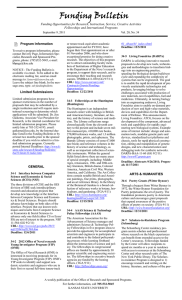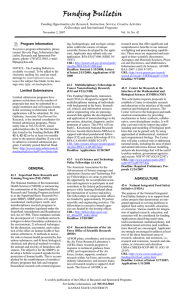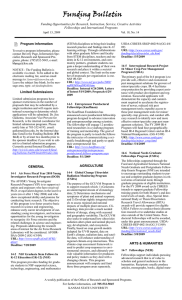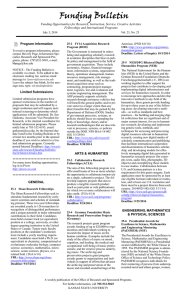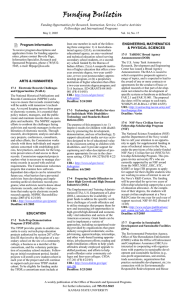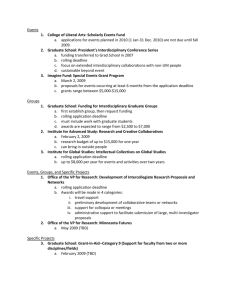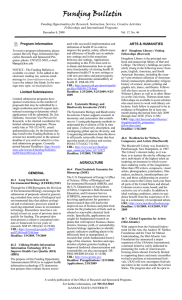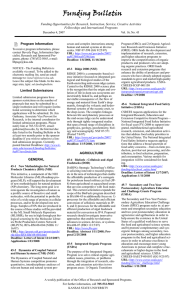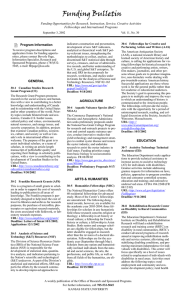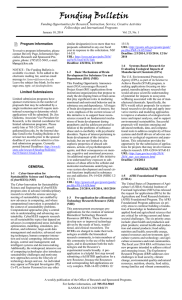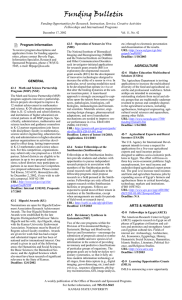U P C O
advertisement
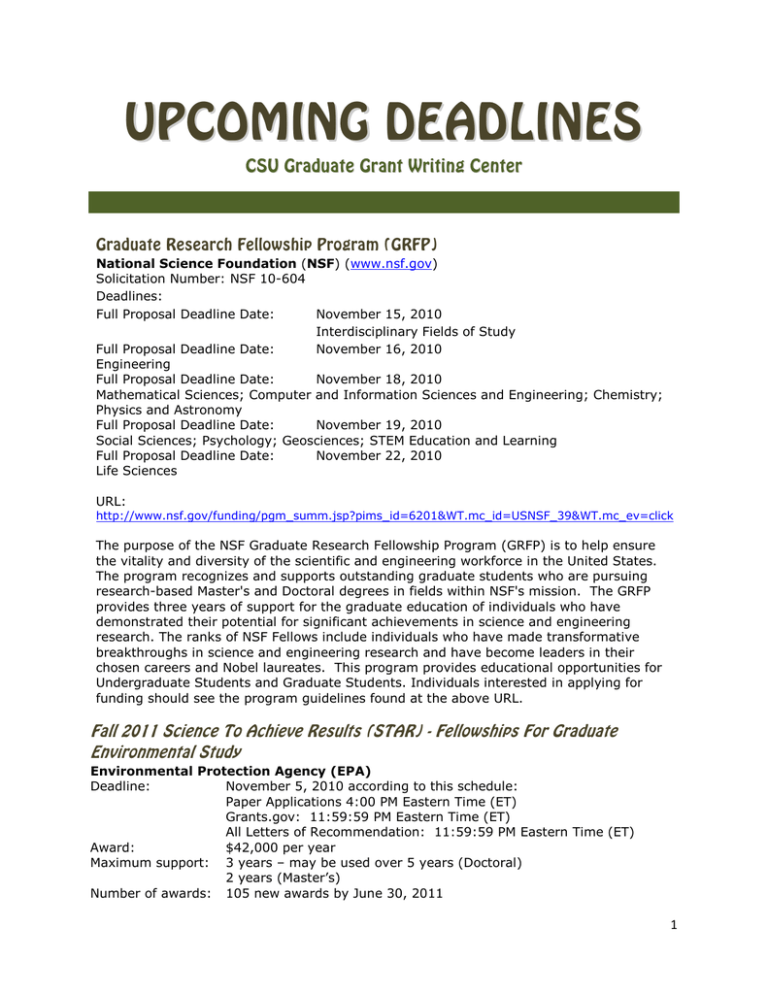
UPCOMING DEADLINES C S U Gradu ate Gr an t Wri ti n g C e n te r Graduate Research Fellowship Program (GRFP) National Science Foundation (NSF) (www.nsf.gov) Solicitation Number: NSF 10-604 Deadlines: Full Proposal Deadline Date: November 15, 2010 Interdisciplinary Fields of Study Full Proposal Deadline Date: November 16, 2010 Engineering Full Proposal Deadline Date: November 18, 2010 Mathematical Sciences; Computer and Information Sciences and Engineering; Chemistry; Physics and Astronomy Full Proposal Deadline Date: November 19, 2010 Social Sciences; Psychology; Geosciences; STEM Education and Learning Full Proposal Deadline Date: November 22, 2010 Life Sciences URL: http://www.nsf.gov/funding/pgm_summ.jsp?pims_id=6201&WT.mc_id=USNSF_39&WT.mc_ev=click The purpose of the NSF Graduate Research Fellowship Program (GRFP) is to help ensure the vitality and diversity of the scientific and engineering workforce in the United States. The program recognizes and supports outstanding graduate students who are pursuing research-based Master's and Doctoral degrees in fields within NSF's mission. The GRFP provides three years of support for the graduate education of individuals who have demonstrated their potential for significant achievements in science and engineering research. The ranks of NSF Fellows include individuals who have made transformative breakthroughs in science and engineering research and have become leaders in their chosen careers and Nobel laureates. This program provides educational opportunities for Undergraduate Students and Graduate Students. Individuals interested in applying for funding should see the program guidelines found at the above URL. Fall 2011 Science To Achieve Results (STAR) - Fellowships For Graduate Environmental Study Environmental Protection Agency (EPA) Deadline: November 5, 2010 according to this schedule: Paper Applications 4:00 PM Eastern Time (ET) Grants.gov: 11:59:59 PM Eastern Time (ET) All Letters of Recommendation: 11:59:59 PM Eastern Time (ET) Award: $42,000 per year Maximum support: 3 years – may be used over 5 years (Doctoral) 2 years (Master’s) Number of awards: 105 new awards by June 30, 2011 1 Program URL: http://www.epa.gov/ncer/rfa/2011/2011_star_gradfellow.html?CFID=10240370&CFTOKEN=28952267 EPA, through the Science to Achieve Results (STARS) program, offers graduate fellowships for master's and doctoral level students in environmental fields of study. The program offers various opportunities to graduate students looking to finance their education in Environmental Studies – visit the above URL for details. 2011- 2012 Fellowships and Grants: Artists, Scholars, Professionals, Students, Faculty Visiting Lectureships American-Scandinavian Foundation (www.amscan.org) Deadline: November 1, 2010 Total amount of awards: $1,000,000 + Fellowships: Up to $23,000 each Duration: 12 Months Short Stay: Up to $5,000 Duration: Less than one year Visiting Lectureships: $20,000 (for one semester) Deadline Visiting Lecture: Letter of Intent: November 5, 2010 The American-Scandinavian Foundation is the leading cultural and educational link between the United States and Denmark, Finland, Iceland, Norway, and Sweden. An American nonprofit organization headquartered in New York City, ASF works to build international understanding with an extensive program of fellowships, grants, intern/trainee sponsorship, publishing, and membership offerings. As a priority, fellowships are intended to support students at the graduate level who need to spend time at foreign academic or research institutions. Short Stay Grants are for research visits, both at the graduate and postdoctoral levels. Funding is available to candidates in all fields. The foundation's Visiting Lectureship program invites US colleges and universities to apply for funding to host a visiting lecturer from Norway or Sweden. Lectureships should be in the areas of public policy, conflict resolution, multiculturalism, environmental studies, or healthcare. The award is not just for Scandinavian studies departments, but for any department or inter-disciplinary program with an interest in incorporating a Scandinavian focus into its course offerings. Complete guidelines and application procedures for all ASF funding programs are available at the above URL. First National Geothermal Student Competition Department of Energy (DOE) Amount of Award: Up to $100,000 Number of awards: Up to 10 URL: http://www1.eere.energy.gov/geothermal/ DOE has announced the inaugural National Geothermal Student Competition offered through the Geothermal Technologies Program (GTP). Geothermal technology allows for consistently produced energy by tapping into the heat of the earth and emits minimal greenhouse gases. Expanding the use of geothermal resources as a domestic energy source will play an important role in increasing America’s energy independence. This is an intercollegiate competition, the first ever to address geothermal education. The student teams will be challenged to advance their understanding of geothermal energy’s potential as a significant contributor to our nation’s energy portfolio. Visit the above URL for details on the competition – soon to be announced. 2 Women’s Sports: Travel & Training Grants Women’s Sports Foundation (WSF) (www.womenssportfoundation.org) Deadline: November 12, 2010 Individual Grant: $5,000 Team Grant: $10,000 URL: http://www.womenssportsfoundation.org/Content/Grants-And-Scholarships/Grants/Travel-andTraining-Fund.aspx The Women's Sports Foundation's provides direct financial assistance to aspiring athletes with successful competitive records who have the potential to achieve even higher performance levels and rankings. The goal of the fund is to provide direct financial assistance to aspiring female athletes who are U.S. citizens or legal residents. Requests for assistance are considered for coaching, specialized training, equipment, attire, and/or travel and will be based, in part, on need. Individual applicants and all members of a team must be female US citizens or legal residents of the US and be eligible to compete for a US national team; have amateur status; demonstrate the ability, based on competitive record and years in training, to reach and compete at an elite level; compete regionally (outside their state), nationally, and/or internationally and/or be ranked by a national governing body; have a successful competitive record within their sport and/or age group; and not be a high school, college, university, or community recreation sports team. Funding requests will not be considered for high school, college, university sports (intercollegiate or club), or community recreation sports teams. Any athlete who is a member of a team already applying for a team grant may not also apply for an individual grant in the same grant period. Complete program guidelines and application procedures are available at the above URL. 3

